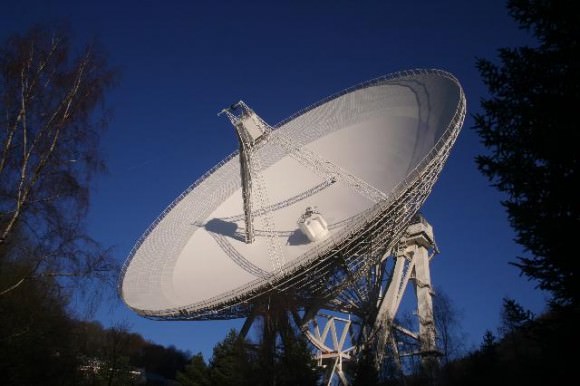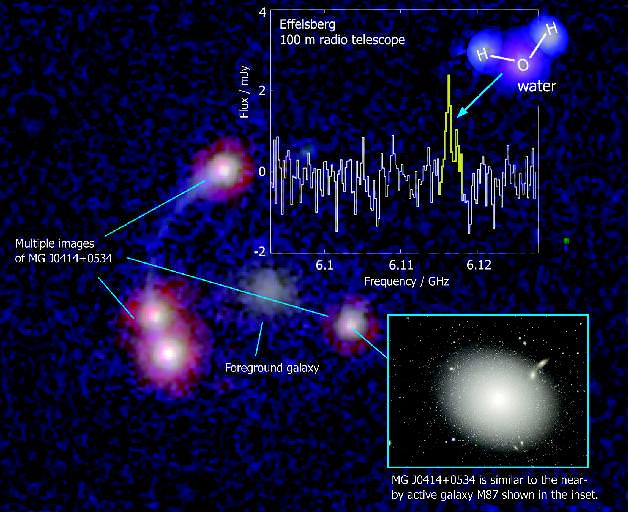[/caption]
A long time ago in a galaxy far, far away there was water. Astronomers have found tell-tale signatures of water molecules in a galaxy more than 11 billion light years from Earth. Using the giant, 100-meter-diameter radio telescope in Effelsberg, Germany, along with the Very Large Array (VLA) in New Mexico, scientists detected the most distant water yet seen in the Universe. Previously, the most distant water had been seen in a galaxy less than 7 billion light-years from Earth. Since it is so far away, we’re actually seeing it as it was long ago; as when the Universe was one-sixth the age it is now. The astronomers were able to take advantage of two types of natural “amplification” to detect the water in this galaxy. The galaxy, dubbed MG J0414+0534 has a quasar — a supermassive black hole powering bright emission — at its core. In the region near the core, the water molecules are acting as masers, the radio equivalent of lasers, to amplify radio waves at a specific frequency. Additionally, another galaxy was used as a gravitational lens to magnify the radio signals used to detect the water molecules.
The astronomers say their discovery indicates that such giant water masers were more common in the early Universe than they are today. At the galaxy’s great distance, even the strengthening of the radio waves done by the masers would not by itself have made them strong enough to detect with the radio telescopes.
With the help of gravitational lensing from another galaxy, nearly 8 billion light-years away, located directly in the line of sight from MG J0414+0534 to Earth, the foreground galaxy’s gravity served as a lens to further brighten the more-distant galaxy and make the emission from the water molecules visible to the radio telescopes.

The astronomers first detected the water signal with the Effelsberg telescope. They then turned to the VLA’s sharper imaging capability to confirm that it was indeed coming from the distant galaxy. The gravitational lens produces not one, but four images of MG J0414+0534 as seen from Earth. Using the VLA, the scientists found the specific frequency attributable to the water masers in the two brightest of the four lensed images.
The radio frequency emitted by the water molecules was Doppler shifted by the expansion of the Universe from 22.2 GHz to 6.1 GHz.
“We were only able to discover this distant water with the help of the gravitational lens,” said Violette Impellizzeri, an astronomer with the Max-Planck Institute for Radioastronomy (MPIfR) in Bonn, Germany. “This cosmic telescope reduced the amount of time needed to detect the water by a factor of about 1,000,” she added.
Water masers have been found in numerous galaxies at closer distances. Typically, they are thought to arise in disks of molecules closely orbiting a supermassive black hole at the galaxy’s core. The amplified radio emission is more often observed when the orbiting disk is seen nearly edge-on. However, the astronomers said MG J0414+0534 is oriented with the disk almost face-on as seen from Earth.
“This may mean that the water molecules in the masers we’re seeing are not in the disk, but in the superfast jets of material being ejected by the gravitational power of the black hole,” explained John McKean, also of MPIfR.
The team’s paper will be published in the Dec. 18 edition of Nature.
Source: NRAO


They found sugar in space, now water… Seems that next is tea.
Water detected from gravitationally lensed maser-emission, existing more than six billion years before our solar system was but a twinkling in the primordial nebula’s eye.
It’s not surprising per se, but it is awe-inspiring to think about when you put it like that.
# Gh. Says:
December 17th, 2008 at 3:27 pm
“They found sugar in space, now water… Seems that next is tea.”
Hopefully we can give the tea a miss and go straight to the good stuff – coffee!
Would a good biochemist/biologist care to give us an evolutionary time-table for cammelia sinensis, or the bean producing coffee? Any system producing either would be a place definitely worth exploring.
You’ll have to take it with you as you go, I’m afraid. Evolution won’t produce elsewhere the same results it produced on Earth. The randomness it has at its core pretty much guarantees it.
Aren’t gravitational lens just the most use astro toy. Couple a galaxies add a little or a lot of gravity and voila! An astronomical magnifying glass.
Meanwhile.Someone,7 billion years ago, in a far off galaxy, saw water on mars.So there may or may not be water there as we speak.
What I`m saying is that if you could travel at the speed of light,once you got there, no garrantee you`d have water for tea or coffee.
Actually,I got it wrong in above post.In a billion years that person will see water on mars! Sheesh!
Jorge says
“Evolution won’t produce elsewhere the same results it produced on Earth. The randomness it has at its core pretty much guarantees it.”
Evolution tries designs by random but only usefulness survives, thats why there hasn’t been many 3 armed humanoids about in last few million years, thus from that only useful evolutions will have survived and the lifeforms will be much the same on a Earthlike world as on Earth, it wouldn’t surprise me if another planet out there somewhere had exactly the same lifeforms as Earth due to the vast numbers of planets and stars and galaxys involved, no one on this planet can even imagine those numbers, so anything is possible.
Jorge says
“Evolution won’t produce elsewhere the same results it produced on Earth. The randomness it has at its core pretty much guarantees it.”
a little OT… but my best guess goes like this:
What looks like randomness could perhaps be seen as a deep level of complexity. I don’t quite accept randomness in natural processing.
also:
Similar input into a natural process leads to similar results.
I expect life to exist throughout the Universe, wherever it can possibly exist, and to be approximately similar under similar conditions.
Now, folks, I don’t claim this to be science. It’s my own sense of intuition… and science doesn’t really care about the way some cranky individual looks at things 😉
Back on topic:
I understand that without water nothing can live.
But what other chemical components does life require? Apart from the obvious… what about metals, especially Calcium, Magnesium and Iron, which are contained in all plants and animals I know? Did they exist that early in the Universe? Do microbes need metals?
Fascinating, all those little discoveries. I find reading about them more interesting, even entertaining, than watching most TV shows.
DUH…
and…
Obvious…
and…
Subjective
and…
Not on subject.
Can we get back on target?